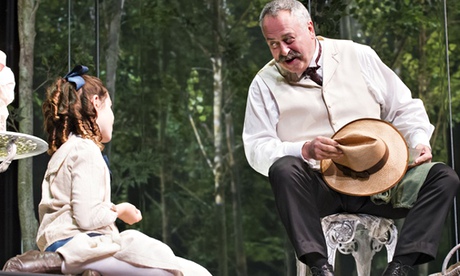
At the heart of Jennifer Haley's play, which won the 2012 Susan Smith Blackburn prize, lies a serious question: do sexual and violent images have consequences? To put it more bluntly, would the creation of a digital paedophile fantasy-world incite or suppress socially damaging desires?
But while the question is articulately addressed, there is an element of sensationalism about this play that I find deeply disturbing. The play could be said to exist, almost literally, in two worlds. In one we see a female cop interrogating a rich businessman, Sims, who is accused of creating a virtual wonderland in which adults act out their darkest desires. This triggers a fascinating debate about whether digital dreamlands legitimise or sublimate people's morbid fantasies. But the play also takes us into another world: the Nether, a futuristic extension of the internet, where Sims has created an imaginative realm in which identity-changing adults engage with the avatar of a prepubescent girl called Iris.
This is where my doubts arise. A stage direction, not enacted in this production, says: "Iris lifts her dress over her head and stands in her knickers"; and, while nothing untoward takes place, Haley plays on our fears of molestation in a way that, for me, vitiates the power of her central argument. Jeremy Herrin's Headlong production handles the situation with extreme tact, and the work of Es Devlin as set designer and Luke Halls as video designer is remarkable in its creation of a three-dimensional, digital space, known as the Hideaway, which resembles a poisoned Victorian Eden. The acting of Stanley Townsend, Amanda Hale, David Beames, Ivanno Jeremiah and Zoe Brough is also very good.
But my doubts linger. Behind the play lies an important debate about the extent to which we can, or even should, censor and control online fantasies. I would take Haley's arguments more seriously, however, if she did not seek to shock us with the threat of present danger.
• Until 9 August. Box office: 020-7565 5000. Venue: Royal Court, London.

